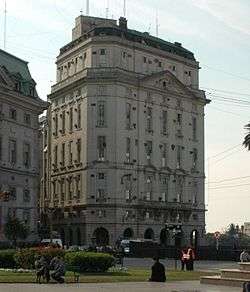Federal Intelligence Agency
The Federal Intelligence Agency (Spanish: Agencia Federal de Inteligencia) mostly known for its abbrevriation AFI, is the principal intelligence agency of Argentina.
| Agencia Federal de Inteligencia | |
 | |
 AFI headquarters in Buenos Aires | |
| Agency overview | |
|---|---|
| Formed | March 5, 2015 |
| Preceding Agency | |
| Type | Intelligence |
| Headquarters | Ave. 25 de Mayo 11, Buenos Aires |
| Employees | 2,000 |
| Agency executive |
|
This organization is the successor to the Secretariat of Intelligence (mostly known for its acronym "SIDE") and has two purposes: to collect national intelligence for governmental needs and criminal intelligence. It also was transferred from the Ministry of Security, to the National Criminal Intelligence.
The agency was created by Law 27126 3 amending the National Intelligence Act entering into force 120 days after enactment of the Act. According to regulations shall govern all communication by the Director General or Deputy Director General any interaction being punished by the members of the AFI any action or relationship regulated by the law establishing the Federal Intelligence Agency. In turn AFI officials should make affidavits without distinction of degrees.
Overview
This agency is ruled by the Law of National Intelligence #25,520, promulgated in March 2015 and entered into force 120 days after that. Changes to previous legislation include the disolution of Secretariat of Intelligence, with the AFI as its successor. Likewise, the Ministry of Security transferred the "National Direction of Criminal Intelligence" to AFI.[2]
The organism was put under the Supreme Court in 2015, alleging that "...the execution of a communication intervention order is carried out by a body other than the one that is part of the investigation"[3]
Board
The AFI main authorities (general director and vice-director) are appointed by the President of Argentina, then confirmed by the Senate. Their functions are regulated by Law 25,520.[4] Prosecutor Cristina Caamaño is the current interventor until the Senate confirm her in the charge. She was appointed in December 2019 by President Alberto Fernández.[5][6]
References
- Autoridades on AFI website
- Ya es oficial: Gils Carbó queda a cargo de las escuchas de Inteligencia, Clarín
- Macri transfirió las escuchas telefónicas a la Corte Suprema on Cba24n, 27 Feb 2018
- Modificatoria on InfoLeg
- Quién es Cristina Caamaño, la Interventora de la Agencia Federal de Inteligencia on FiloNews
- La fiscal Cristina Caamaño fue designada como interventora de la AFI at Infobae, 19 Dec 2019
